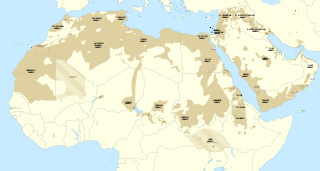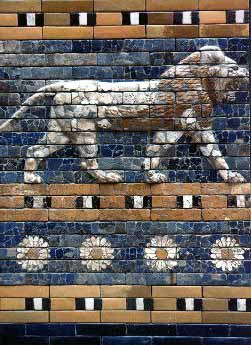
Libya, officially the State of Libya, is a country in the Maghreb region of North Africa. Libya borders the Mediterranean Sea to the north, Egypt to the east, Sudan to the southeast, Chad to the south, Niger to the southwest, Algeria to the west, and Tunisia to the northwest. Libya comprises three historical regions: Tripolitania, Fezzan, and Cyrenaica. With an area of almost 1.8 million km2 (700,000 sq mi), it is the fourth-largest country in Africa and the Arab world, and the 16th-largest in the world. Libya claims 32,000 square kilometers of southeastern Algeria, south of the Libyan town of Ghat. The country's official religion is Islam, with 96.6% of the Libyan population being Sunni Muslims. The official language of Libya is Arabic, with vernacular Libyan Arabic being spoken most widely. The majority of Libya's population is Arab. The largest city and capital, Tripoli, is located in northwestern Libya and contains over a million of Libya's seven million people.

The Semitic languages are a branch of the Afroasiatic language family. They include Arabic, Amharic, Aramaic, Hebrew, and numerous other ancient and modern languages. They are spoken by more than 330 million people across much of West Asia, North Africa, the Horn of Africa, Malta, and in large immigrant and expatriate communities in North America, Europe, and Australasia. The terminology was first used in the 1780s by members of the Göttingen school of history, who derived the name from Shem, one of the three sons of Noah in the Book of Genesis.

Tripoli is the capital and largest city of Libya, with a population of about 1.183 million people in 2023. It is located in the northwest of Libya on the edge of the desert, on a point of rocky land projecting into the Mediterranean Sea and forming a bay. It includes the port of Tripoli and the country's largest commercial and manufacturing center. It is also the site of the University of Tripoli.

The Arab world, formally the Arab homeland, also known as the Arab nation, the Arabsphere, or the Arab states, comprises a large group of countries, mainly located in Western Asia and Northern Africa. While the majority of people in the Arab world are ethnically Arab, there are also significant populations of other ethnic groups such as Berbers, Kurds, Somalis and Nubians, among other groups. Arabic is used as the lingua franca throughout the Arab world.

The culture of Iraq or the culture of Mesopotamia is one of the world's oldest cultural histories and is considered one of the most influential cultures in the world. The region between the Tigris and Euphrates rivers, historically known as Mesopotamia, is often referred to as the cradle of civilisation. Mesopotamian legacy went on to influence and shape the civilizations of the Old World in different ways such as inventing writing, mathematics, law, astrology and many more fields. Iraq is home to diverse ethnic groups who have contributed to the wide spectrum of the Iraqi Culture. The country is known for its poets، architects، painters and sculptors who are among the best in the region, some of them being world-class. The country has one of the longest written traditions in the world including architecture, literature, music, dance, painting, weaving, pottery, calligraphy, stonemasonry and metalworking.

Saif al-Islam Muammar al-Gaddafi is a Libyan political figure. He is the second son of the late Libyan leader Muammar Gaddafi and his second wife Safia Farkash. He was a part of his father's inner circle, performing public relations and diplomatic roles on his behalf. He publicly turned down his father's offer of the country's second highest post and held no official government position. According to United States Department of State officials in Tripoli, during his father's reign, he was the second most widely recognized person in Libya, being at times the de facto prime minister, and was mentioned as a possible successor, though he rejected this. An arrest warrant was issued for him on 27 June 2011 by the International Criminal Court (ICC) for charges of crimes against humanity against the Libyan people, for killing and persecuting civilians, under Articles 7(1)(a) and 7(1)(h) of the Rome statute. He denied the charges.

Al-Waleed, or Waleed, also spelt as Al-Walid, Walid, Oualid, or Velid, is an Arabic-language masculine given name meaning 'child.

Zliten is a city in Murqub District of Libya. It is located 160 km to the capital of Tripoli.
Tunisian literature exists primarily in Arabic and in French. Arabic literature in Tunisia dates to the 7th century, with the arrival of Arab civilization in the region. Arabic literature is more important than francophone literature—which followed the introduction of the French protectorate in 1881—both in volume and value. The national bibliography lists 1,249 non-academic books published in 2002 in Tunisia, of which 885 titles are in Arabic. Nearly a third of these books are intended for children.

Human habitation in the North African region began over one million years ago. Remains of Homo erectus during the Middle Pleistocene period, has been found in North Africa. The Berbers, who generally antedate by many millennia the Phoenicians and the establishment of Carthage, are understood to have arisen out of social events shaped by the confluence of several earlier peoples, i.e., the Capsian culture, events which eventually constituted their ethnogenesis. Thereafter Berbers lived as an independent people in North Africa, including the Tunisian region.

Arab-Berbers are a population of the Maghreb, a vast region of North Africa in the western part of the Arab world along the Mediterranean Sea and the Atlantic Ocean. Arab-Berbers are people of mixed Arab and Berber origin, most of whom speak a variant of Maghrebi Arabic as their native language, some also speak various Berber languages. Many Arab-Berbers identify primarily as Arab and secondarily as Berber.
Abdelhakim Belhaj is a Libyan politician and military leader. He is the leader of the Islamist al-Watan Party and former head of the Tripoli Military Council. He was the emir of the defunct Libyan Islamic Fighting Group, an anti-Gaddafi guerrilla group.

Gaddafi loyalism, in a wider political and social sense also known as the Green resistance, consists of sympathetic sentiment towards the overthrown government of Muammar Gaddafi, who was killed in October 2011, and his Third International Theory. Despite Muammar Gaddafi's death, his legacy and Jamahiriya ideology still maintains a popular appeal both inside and outside Libya into the present day. Regardless, the Western sentiment has largely been that this continued support may contribute to some of the ongoing violence in Libya.

The Libyan civil war (2014–2020), also more commonly known as the Second Libyan Civil War, was a multilateral civil war which was fought in Libya between a number of armed groups, but mainly the House of Representatives (HoR) and the Government of National Accord, for six years from 2014 to 2020.

Ancient Semitic-speaking peoples or Proto-Semitic people were speakers of Semitic languages who lived throughout the ancient Near East and North Africa, including the Levant, Mesopotamia, the Arabian Peninsula and Carthage from the 3rd millennium BC until the end of antiquity, with some, such as Arabs, Arameans, Assyrians, Jews, Mandaeans, and Samaritans having a continuum into the present day.

Libyan–Tunisian relations are longstanding between the two neighbouring North African Maghreb states, Libya and Tunisia.
Mahjoub is a Muslim Arabic male given name and surname. Other romanizations from the Arabic script include Mahdjoub, Mahjub, Mahdschub, Mahjoob, Mahgoub, Mahgub and Mahgoob. Notable people with this name include:

The Popular Front for the Liberation of Libya is a Gaddafi loyalist militia and political party that aims to elect Saif al-Islam Gaddafi, son of the late Libyan leader Muammar Gaddafi, as president of Libya.
The following lists events that happened during 2020 in North Africa. The countries listed are those described in the United Nations geoscheme for Africa: Algeria, Egypt, Libya, Morocco, Sahrawi Arab Democratic Republic, Sudan, Tunisia, and Western Sahara
















